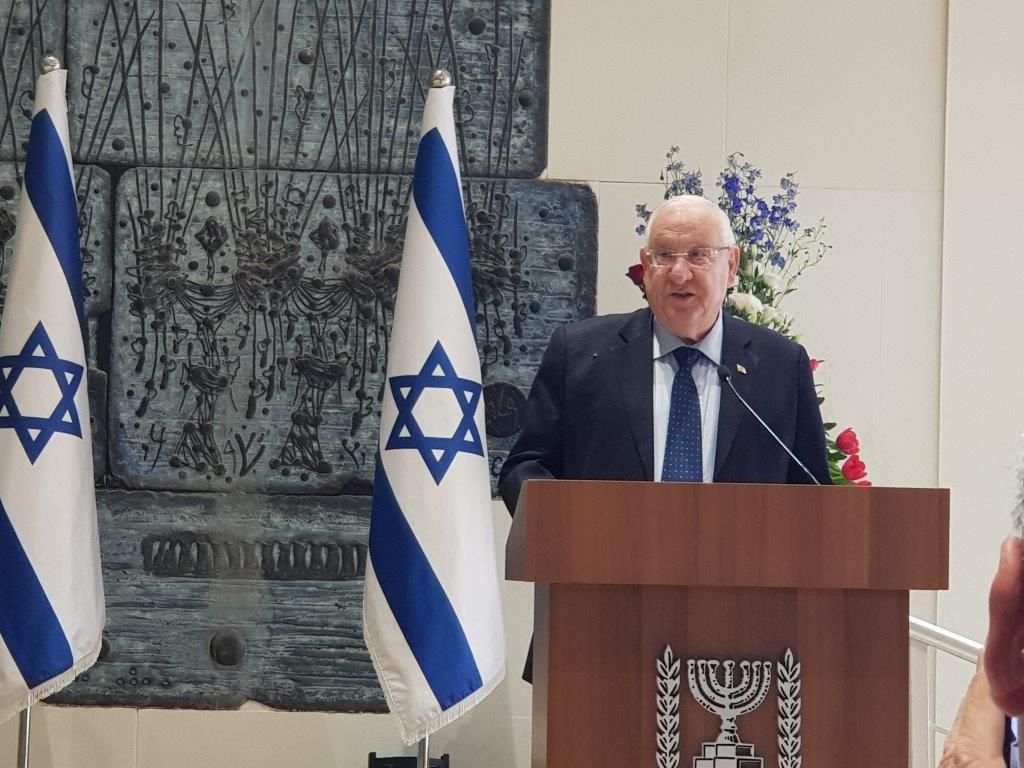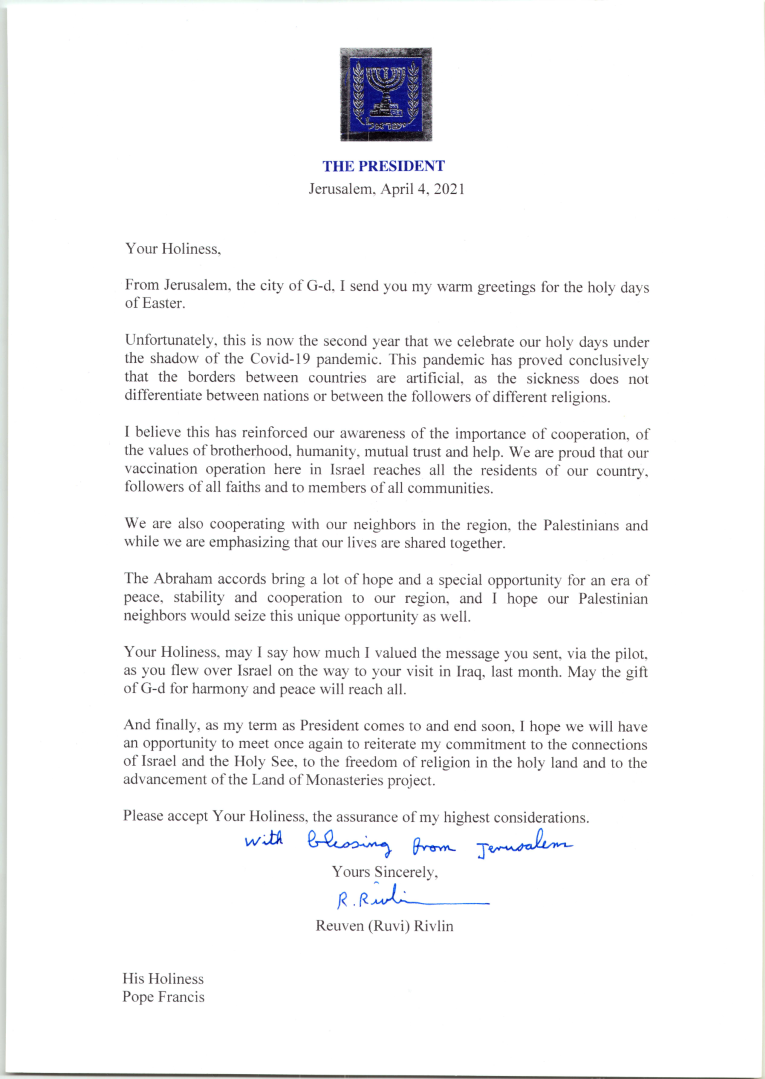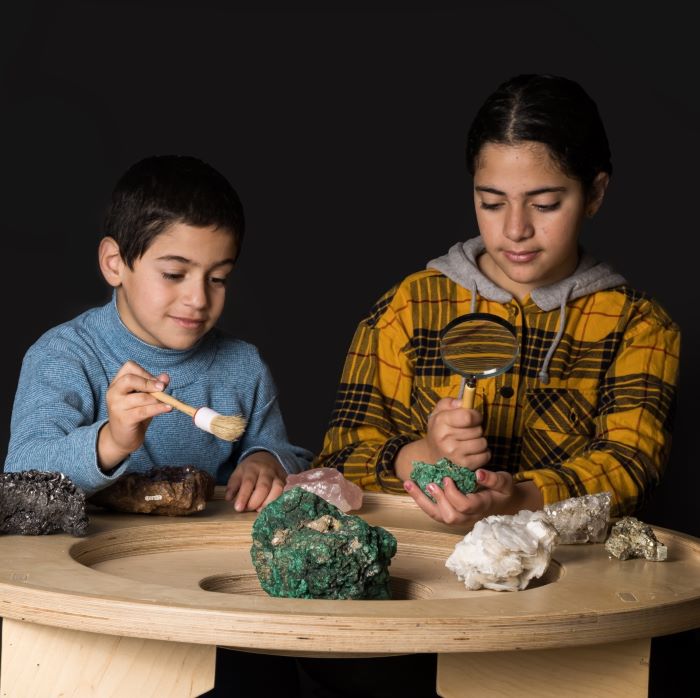Art & Culture
- Details
- Written by Silvia

President of Israel Reuven (Ruvi) Rivlin today, Friday 2 April / 20 Nissan, sent a letter to His Holiness Pope Francis I for Easter, wishing the Holy Father and Christians around the world his greetings for the holy days of Easter.
President Rivlin’s letter in full:
“Your Holiness,
From Jerusalem, the city of G-d, I send you my warm greetings for the holy days of Easter.
Unfortunately, this is now the second year that we celebrate our holy days under the shadow of the Covid-19 pandemic. This pandemic has proved conclusively that the borders between countries area artificial, as the sickness does not differentiate between nations or between the followers of different religions.
I believe this has reinforced our awareness of the importance of cooperation, of the values of brotherhood, humanity, mutual trust and help. We are proud that our vaccination operation here in Israel reaches all the residents of our country, followers of all faiths and to members of all communities.
We are also cooperating with our neighbors in the region, the Palestinians and while we are emphasizing that our lives are shared together.
The Abraham Accords bring a lot of hope and a special opportunity for an era of peace, stability and cooperation to our region, and I hope our Palestinian neighbors would seize this unique opportunity as well.
Your Holiness, may I say how much I valued the message you sent, via the pilot, as you flew over Israel on the way to your visit in Iraq, last month. May the gift of G-d for harmony and peace will reach all.
And finally, as my term as president comes to and end soon, I hope we will have an opportunity to meet once again to reiterate my commitment to the connections of Israel and the Holy See to the freedom of religion in the Holy Land and to the advancement of the Land of Monasteries project.
Please accept, Your Holiness, the assurance of my highest considerations.”

Copy of President Rivlin’s letter to the Pope
President photo credit Silvia Golan ( from 28 November 2018)
- Details
- Written by Maccabi World Union

Dear Friends,
We are already in the Hebrew month of Nisan, preparing our hearts and souls for the arrival of the Festivity with greater activities for the whole family: Pesach, the Jewish people’s Festival of Freedom from the yoke imposed by the Ancient Egyptians 3,300 years ago. Pesach’s celebration takes 7 days (7 + 1 in the Diaspora), which have as their main distinction the consumption of matzah and the prohibition of chametz, and, of course, the family gathering around the table and the reading of the Passover Haggadah, the story of the freedom of Egypt during the Seder of Passover.
We also read, on the Shabbat of Passover, the biblical book of Shir Hashirim, The Song of Songs. The reason our exegetes – traditional Bible commentators – teach us for this reading during Passover lies in two verses of that biblical book: the first verse refers to spring - Passover also being Chag HaAviv, the Spring Festival; the second one, evokes the departure from Egypt - the central motif of Pesach, Chag HaCherut.
The Song of Songs is the quintessential book of love for the Jewish people, narrating, in a vivid, poetic and moving way, the love and passion relationship between a man and a woman - with powerful images and descriptions of that love. If someone did not know that The Song of Songs is part of the Bible sanctified by the Sages of Israel, and read it for the first time, s/he would think that it is an ancient secular work of supreme and even erotic love. Surprisingly it was our Sages those who decided to include The Song of Songs as part of the Guiding Book of all the West, the Hebrew Bible, explaining that the loving characters of Shir HaShirim are God himself - the bridegroom - and the people of Israel – His bride... making Shir HaShirim's story an allegory in its entirety.
Researchers wondered how such a book of human love - with such detailed expressions of love between man and woman - was included among the other Holy Books of the Bible; how is it that a book that has the most human love as its central theme - and owner of phrases of high sensual content - could have made "a place" among the books of Psalms, Proverbs and others. The researchers' response is surprising because of its relevance: The Song of Songs was included in the Bible ... by popular outcry. The Children of Israel adored the 8 chapters of that book of love - and it was they who "demanded" its inclusion in the Hebrew Bible that would be the Road Map of the Jewish people - and of the entire West Civilization. Yes: our Sages explained the Song of Songs as an allegory of the deep, loving, meaningful and eternal bond between the Creator and the Bride that He chose for Himself - the Jewish people ... and, with this, our ancestors saw fulfilled their need to include the theme of human love in their Master Book - since the totality of human experience cannot be explained without organically including the theme of love, the most powerful feeling that links us to one another. The Morals of the West had to include Love - which so often sustains everything.
Love is the basis of Divine Creation. Love is, in immeasurable examples, the inspiration of human creation in the arts, music, literature, cinematography - sometimes romanticized and infantilized, sometimes respected and justly exalted. It is a fundamental part of the fulfillment of each one of us, human beings; that base that allows to establish strong families, consolidated marriages, memorable friendships for a lifetime, and gatherings of human beings through common causes. Love is a living and positive force, indispensable for the functioning of the whole society. The creators of contemporary music transmitted this to us with simplicity and forcefulness: John Lennon said that "All you need is love", to which Paul McCartney added: "And, in the end / the love you take / is equal to the love you make.”
In this year in which we were deprived of our loving hugs on so many occasions due to the forced confinement of the disastrous pandemic, we suffered more than ever the absence of that love that heals so much and cures so much. Pesach reminds us that its central value, the Freedom of a people, occurred within the framework of the love between God and our people liberated through Divine Love – we, who must learn to bond through love with each other to arrive at what is most sublime of our goals. That is the message of the Song of Songs and the one we need so much these days, where we begin to meet again with those we love in a warm and deep hug of solidarity.
May this Seder and all our future Seders be celebrated in times of liberation and redemption of our People and of all men and women of good deeds!
May God give us inspiration to respond with responsibly to the calls of Freedom.
And May God awards us to have a Passover of many gatherings, many hugs, a lot of family, a lot of love... and that all Humanity is freed from the challenge of this pandemic.
Chag Pessach Sameach!
Chazak ve'Ematz!
Rabbi Carlos A. Tapiero
Deputy Director-General & Director of Education
Maccabi World Union
Photo courtesy Rabbi Carlos A. Tapiero
- Details
- Written by Silvia G. Golan

.The Bible Lands Museum Is Open Again to the Public, with Special Exhibitions, Guided Tours and Exciting Lectures!
Visits and tickets for the museum activities are available by advance registration only, and in accordance with the “purple tag” guidelines.
For more information visit the museum website: www.blmj.org or contact us by phone: 02-5611066
Opening hours: Sun-Tue 9:30-17:00 | Wed 9:30-20:00 | Thu-Sat Closed
Bible Lands Museum, Shmuel Stephen Wise Str. 21, Jerusalem. Free parking is available in the museum's parking lot.
Following the new directives by the Government of Israel for reopening cultural institutions, starting on Tuesday, February 23rd 2021, and until further notice, the museum will reopen for visits within a set time frame and with advance registration. Additionally, guided tours in the museum will be offered without additional charge to the museum entrance fee.
Free entrance for children on Wednesdays – starting from 15:30pm.
This is an opportunity to visit our special exhibition, “Yemen: From Sheba to Jerusalem,” that had opened only shortly before the coronavirus outbreak, and enjoy an enchanting visit to one of the most remote Bible lands. The exhibition presents the culture of ancient South Arabia (Yemen) – the source of the precious resins of frankincense and myrrh that reached the Land of Israel and the neighboring lands via the famous incense route. The rich and fascinating culture of Ancient South Arabia gave rise to the biblical story about the Queen of Sheba.
Guided tours in the museum and the exhibition will be held on the following days and times, in Hebrew and available by pre-registration only: Sun-Wed: 11:00, another tour by Wed: 17:00.
Guided tours for private groups or in additional languages can be arranged by pre-registration: 02-5955305
Museum visits without a guided tour are available on: Sun-Wed 9:30-11:00, 11:00-12:30, 12:30-14:00, 14:00-15:30, 15:30-17:00; Wed: 17:00-18:30, 18:30-20:00
Our Wednesday lecture series continues with a variety of fascinating talks on topics of archaeology, history, anthropology and the Bible, by leading museum professionals and renown scholars. Each lecture lasts about an hour and is held on Zoom. Free.
When: Wednesdays at 18:00
For details and registration: https://bit.ly/2EUiSza

* All programs are subject to change; updates will be available on our website and Facebook page.
A visit at the museum is limited to a specific time frame, in accordance with the Purple Tag guidelines: wearing a mask, having your temperature measured at the entrance, and social distancing.
- Details
- Written by Silvia G. Golan

Treasures of the Earth Discover the stones, crystals, and natural wonders hidden deep under the ground through a variety of unique workshops,
art installations, and demonstrations!
* Sand Pendulum* Earth Labyrinth * Electrifying Crystals *
* Mandala Complex * Clay Making * Crystal Research Lab*
* Magic Sand & Stone Workshop *
* Art Exhibit by Betzalel Graduates *
And much more….
A Passover event for the whole family at the Bloomfield Science Museum Jerusalem 20.3 - 4.4
Every day we step on it, dig foundations in it, and run pipes through it. We drill, carve, extract, and pump. We are tied to it, fight for it, and swear by it …but what do we really know about the land beneath our feet?
This Passover, the Bloomfield Science Museum Jerusalem invites the whole family- young and old alike- to get their hands dirty! Come discover the natural wonders hidden below our feet with a variety of demonstrations, workshops, and art installations, including: a sand pendulum, a huge earth maze (c 80 sq.m!), electrifying crystals, a mandala complex built by artist and designer Roi Aminoff, a clay-making activity, a crystal research laboratory, a “magic” sand and stone workshop, an exhibition of earth art, and more!
Sand pendulum
An interactive exhibit whose movement produces complex and beautiful sand paintings. Once all the sand in the pendulum has run out, you can collect it and refill the container over and over. Be warned- it’s addictive!
Earth Labyrinth
In this “puzzle of paths”, the thrill of the unknown and the possibility of not finding the way out invites young visitors to summon their courage and face their greatest fear and deepest desire: walking the path alone. Visitors are invited to walk the labyrinth by themselves, to even get lost for a moment, and finally, to solve the puzzle. At the "Treasures of the Earth" event, children will be able to touch the earthen walls that surround them as they search for the solution and as they find their way back to “safety” - their parents. Boys and girls will be able to run around, explore, and perhaps rest for a moment between the mud walls. The giant maze will be built by Ofer Robbins, an expert in the construction of mud and straw homes. From age of 3 to 10
Electrifying crystals
Demonstrations with models and genuine objects that reveal the connection between crystals and familiar electronic devices such as air purifiers, lighters, speakers, clocks, and miniature motors. Visitors will learn about how piezoelectricity- discovered by Pierre Curie in 1880- is a trait peculiar to crystals, and how the passage of an electrical current through crystals causes them to vibrate (and vice versa).
From age of 8 and up
Mandala Complex
Artist and designer Roy Aminoff creates fascinating spaces and art installations, in which the viewer is transported to inner worlds through colors, shapes, and textures. Aminoff and his team will arrive at the Museum over Passover (20.3—23.3) and build a huge mandala from various types of earth and clay in the Museum's entrance courtyard.
As mentioned, from March 20 through 23, the artist will build the mandala in front of the audience. During the rest of the event, visitors can view the spectacular result.
.
What’s the Matter? - Clay Workshop
A hands-on learning experience designed for families but aimed particularly at children. Children will experience the process of creating clay from raw materials. They will crush rock in a mortar and pestle, strain it, and add water to create a product that will become part of a collaborative work. Participants will learn about the properties of the materials around us – including kitchen utensils, floor tiles, and even works of art. They will discover where the materials came from and what needs to be done so that it can be processed and used. The workshop will be accessible and suitable for all ages (from the age of one and a half).
Crystal Research Laboratory
From kitchen salt to the most valuable gemstones, not a day goes by without us using mineral crystals! In the Crystal Research Laboratory, visitors will be able to discover for themselves the special properties of various types of crystals - fizzing crystals, magnetizing crystals, polarizing crystals, and more. In addition, children and parents are invited to solve the mystery of white crystals, and enjoy a spectacular display of beautiful crystals borrowed from the national collections of the Hebrew University.
Workshop - Magic with Sand and Stones
How can a stone submerged in sand be made to rise and "float" on the sand, without actually touching the sand or stone? In this workshop, participants will discover a surprising way to do it! The answer is based on a scientific phenomenon called the "Brazil Nut Effect", which occurs in your box of cornflakes, mudslides, snow drifts, and many other places.
Earth Art
Bezalel graduates present an exhibition of works of art created from raw materials of the earth, such as ceramics and glass. At the exhibition, visitors will encounter “out-of-this-world” art- created from materials found deep within it!
The Bloomfield Science Museum Jerusalem, is the ultimate in entertainment for the whole family. In addition to the Passover event, the Museum features more than 10 unique interactive exhibits that appeal to a wide range of ages.
In keeping with the Ministry of Health’s requirements for the “Purple Pass”, the Museum has been carefully organized and modified: At the entrance a temperature test will be performed, visitors must wear masks during their entire stay, keep a distance of 2 meters, and obey the instructions of the guides.
“Treasures of the Earth”- Passover at the Bloomberg Science Museum Jerusalem
March 20 - April 4, 2021
Hours: Sun-Thurs 11:00-17:00, Fri 10:00-14:00, Sat 10:00-16:00
The Museum will be closed Saturday 26.3, Passover eve
Ticket Prices:
Children up to age 5- free, 5 and up/adult- 45 NIS
Family ticket (parents/grandparents with their kids/grandchildren)- 160 NIS
Discounts available for 'Jerusalem' resident card holders, soldiers,
security forces, disabled, retirees, and customer clubs
Tickets must be purchased and visits coordinated IN ADVANCE ONLY through the website: www.mada.org.il
For further information, call 02-654-4888
Photo Yonatan Ben Chaim
- Details
- Written by Tel Aviv-Yafo Muni

Tel Aviv-Yafo Municipality: Runners worldwide warm up for the Tel Aviv Samsung Marathon 2021
More than 20,000 participants from over 30 countries expected to join digital Tel Aviv Marathon * International challenge offers flights, entry to 2022 race *
More than 20,000 runners from over 30 countries are heading into the final straight of their preparations for the Tel Aviv Samsung Marathon 2021, which will commence February 19 in a digital format across the world.
Overcoming the challenges of the COVID-19 pandemic, the marathon will break down borders and virtually bring together running enthusiasts in countries including Israel, the United States, United Kingdom, Russia, Brazil and Italy.
The slogan "All Running Together Separately" is at the heart of the event, inviting all runners – amateurs and professionals alike – to excel and join thousands of other participants across the world at the same time, each one following a local course designed especially for him or her by a dedicated smartphone app.
The event, an initiative of Tel Aviv-Yafo Municipality and produced by Kapaim, will include the following distances: Marathon (42.195 km.), half-marathon (21.1 km.), 10 km. and 5 km. Participants can run their chosen distance from February 19 at 6 a.m. (IST) to February 25 at 9 p.m. (IST).
Runners across the world are also encouraged to join the Tel Aviv Samsung Marathon 2021 challenge – Feet Abroad, Heart In Tel Aviv – to stand a chance of winning free flights sponsored by the Israel Ministry of Tourism and entry to the Tel Aviv Marathon 2022.
Ron Huldai, Mayor of Tel Aviv-Yafo: "If we needed proof that this city, Tel Aviv-Yafo, is the nonstop city, then the marathon is the best evidence. Even during this incredibly challenging year, when the reality of our lives changed entirely, we are not giving up on this much-loved event. Tel Aviv-Yafo is one of the first cities in the world to hold a digital marathon, befitting the city that is the Start-Up City of the Start-Up Nation. I wish all the runners joining us from New York to Dubai, from Moscow to London, and from Mexico City to Madrid, good luck and, above all, stay healthy."
Ronen Salem, VP Marketing, Samsung Israel: "Samsung Israel is proud to lead the largest sports event in the country for an eighth time, especially during this complex year. Holding the marathon this year, in a digital and innovative format, symbolizes more than anything our victory as a society and community over the limitations of the current period. This year, all the participants will run alone, but as together as possible, using an innovative app which enables each runner to reach the limit of their abilities and win. Good luck and health to all participants."
Prior to race week, runners will receive a link to download a smartphone race app and participation instructions. The app will design a localized running route, broadcast a start line ceremony, offer interactive monitoring of race times, provide encouraging messages and playlists, and enable viewing and sharing of photos captured along race routes. The app will also design a personalized certificate upon finishing the race.
Full race kits have been sent to participants worldwide, including a drawstring bag, an official marathon running shirt, a personal runner number, a medal, a "finisher" sticker and various gifts.
Looking ahead to the Tel Aviv 2022 marathon, Tel Aviv Global & Tourism has launched this year's marathon challenge – Feet Abroad, Heart In Tel Aviv. To win free flight tickets sponsored by the Israel Ministry of Tourism and entry to next year's marathon, participants simply need to order the official marathon runner's kit, wear their marathon shirt and send us a video or picture as they sprint through their hometown on race day.
An international team of prominent running and fitness influencers will also run in the marathon, bringing the event to a large audience across social media. Leading influencers include Milind Usha Soman (India), Tatiana Serur (Mexico), Courtney Pruce (UK) and Elizabeth Savetsky (USA).
Tel Aviv-Yafo is excited to welcome runners back to the city for the 2022 marathon. The race, recognized as one of the world's top winter sporting events due to the city's warm year-long climate, sees participants enjoy a stunning 42 km. route winding its way through the beating heart of the city, running through Sarona, Rabin Square, Old Jaffa and alongside the white sandy beaches of the Mediterranean Sea.
Registration is open until 13.2.21: https://www.tlvmarathon.co.il/MenuDefault_en.aspx?Id=6770








